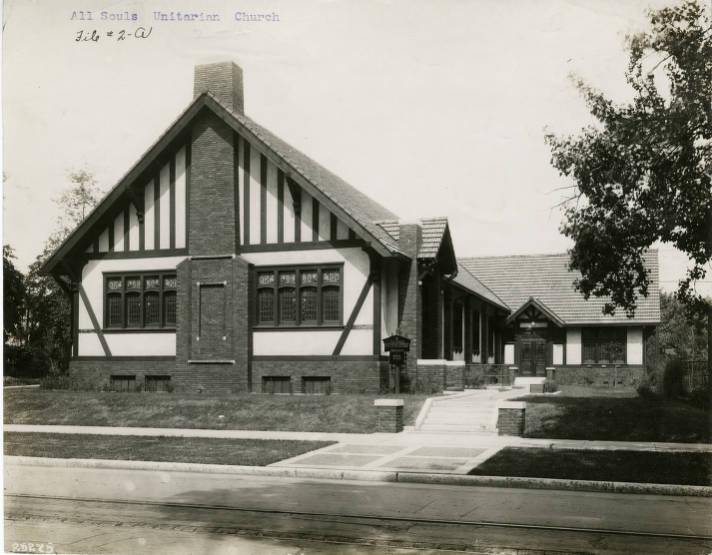In 1961, the Unitarian and Universalist churches in the United States and Canada merged to form a new body called the Unitarian Universalist Association of Congregations in North America. Both groups could point to a long organizational history in the United States reaching back to the 18th century. Unitarian-Universalists uphold a rational non-creedal faith emphasizing spiritual freedom and the universal love of God.

The formal introduction of Universalism to Indianapolis can be traced to an 1830 debate between Universalist Jonathan Kidwell and Methodist Edwin M. Ray held in the Methodist meetinghouse. Organizationally, the Oaklandon Universalist Church dates its beginnings to 1838 and the formation of the Universalist Society of . The body formally organized in 1850 with 25 members. The present church building at 6450 Oaklandon Road arose in 1926 from the ashes of a second devastating fire in that decade. The church claims to be the oldest continuous church in the township.
The Unitarians did not organize in Indianapolis until 1868; that first congregation only persisted until 1871. The denomination floundered until 1903 and the founding of All Souls Unitarian Church and the 32-year pastorate of Frank Scott Corey Wicks (1905-1937). The congregation selected “All Souls” because it wished to include anyone desiring a liberal fellowship regardless of personal beliefs and previous affiliation and was the name of the first minister’s previous congregation. The church’s slogan became “A Religious Center with a Civic Circumference,” expressive of the congregation’s interest in community work and social justice issues that have been hallmarks of Unitarianism-Universalism in the city. In 1911, All Souls built a sanctuary at Alabama and 15th streets and enlarged it in the early 1930s. The church moved to its present location at 5805 East 56th Street in 1959. The Alabama Street building still stands and has been adapted for use as a residence and artist studios (See ). All Souls, the largest Unitarian Universalist church in the county, serves over 700 adults and children.

Both Oaklandon and All Souls chose to retain their historical names after the consolidation in 1961. Newer bodies elected to identify themselves with the names of both faiths. The Circle Unitarian Universalist Fellowship, composed of former All Souls members, formed in 1971. Its decision to remain a fellowship rather than become a church reflected the congregation’s desire to forego formality and professional leadership for self-generating programs and shared leadership responsibilities. The “Circle” in its name defines its structural preference for circular seating, symbolic of participant equality. The fellowship voted to dissolve in August 2015.
In like manner, 93 persons from All Souls and from throughout the metropolitan area chartered the Unitarian Universalist Church of Indianapolis, which held its first service on January 7, 1979, at . In the spring of 1981, the congregation took out loans to buy the campus of what is now known as at 615 West 43rd Street. The four-building complex is now home to the church.
All Indianapolis-area churches associate in the Heartland Unitarian Universalist District. Estimates of active membership in 2020 number around 520 in the three active congregations.

Help improve this entry
Contribute information, offer corrections, suggest images.
You can also recommend new entries related to this topic.


